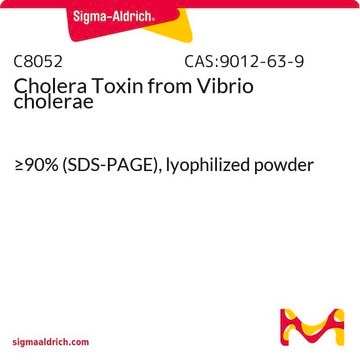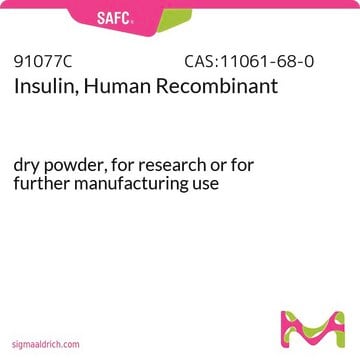SRP3024
CYR61 human
recombinant, expressed in E. coli, ≥95% (SDS-PAGE), ≥95% (HPLC), suitable for cell culture
Synonym(s):
CCN1, GIGI protein
Sign Into View Organizational & Contract Pricing
All Photos(1)
About This Item
UNSPSC Code:
12352200
NACRES:
NA.32
Recommended Products
biological source
human
recombinant
expressed in E. coli
Assay
≥95% (HPLC)
≥95% (SDS-PAGE)
form
lyophilized
potency
≤0.1 ng/mL
mol wt
39.5 kDa
packaging
pkg of 20 μg
technique(s)
cell culture | mammalian: suitable
impurities
<0.1 EU/μg endotoxin, tested
color
white to off-white
UniProt accession no.
shipped in
wet ice
storage temp.
−20°C
Gene Information
human ... CYR61(3491)
General description
CYR61 is a member of the CCN family of secreted cysteine rich regulatory proteins. CYR61 induces angiogenesis by stimulating the proliferation, migration, and adhesion of endothelial cells. Cell migration and adhesion are mediated through binding to specific cell surface integrins and to heparin sulfate proteoglycans. Increased expression of CYR61 is associated with several types of cancer, and correlates with the progression and estrogen independence of human breast cancers. Recombinant human CYR61 is a 39.5 kDa protein containing 357 amino acid residues. It is composed of four distinct structural domains (modules); the IGF binding protein (IGFBP) domain, the von Willebrand Factor C (VWFC) domain, the Thrombospondin type-I (TSP type-1) domain, and a C-terminal cysteine knot-like domain (CTCK).
Biochem/physiol Actions
CYR61 is a member of the CCN family of secreted cysteine rich regulatory proteins. Recombinant human CYR61 is a 39.5 kDa protein containing 357 amino acid residues. It is composed of four distinct structural domains (modules); the IGF binding protein (IGFBP) domain, the von Willebrand Factor C (VWFC) domain, the Thrombospondin type-I (TSP type-1) domain, and a C-terminal cysteine knot-like domain (CTCK).
Sequence
MTCPAACHCP LEAPKCAPGV GLVRDGCGCC KVCAKQLNED CSKTQPCDHT KGLECNFGAS STALKGICRA QSEGRPCEYN SRIYQNGESF QPNCKHQCTC IDGAVGCIPL CPQELSLPNL GCPNPRLVKV TGQCCEEWVC DEDSIKDPME DQDGLLGKEL GFDASEVELT RNNELIAVGK GSSLKRLPVF GMEPRILYNP LQGQKCIVQT TSWSQCSKTC GTGISTRVTN DNPECRLVKE TRICEVRPCG QPVYSSLKKG KKCSKTKKSP EPVRFTYAGC LSVKKYRPKY CGSCVDGRCC TPQLTRTVKM RFRCEDGETF SKNVMMIQSC KCNYNCPHAN EAAFPFYRLF NDIHKFRD
Physical form
Lyophilized from 10 mM Sodium Citrate, pH 3.0 + 50 mM NaCl.
Reconstitution
Centrifuge the vial prior to opening. Reconstitute in water to a concentration of 0.1-1.0 mg/ml. Do not vortex. This solution can be stored at 2-8°C for up to 1 week. For extended storage, it is recommended to further dilute in a buffer containing a carrier protein (example 0.1% BSA) and store in working aliquots at -20°C to -80°C.
Storage Class Code
11 - Combustible Solids
WGK
WGK 3
Flash Point(F)
Not applicable
Flash Point(C)
Not applicable
Certificates of Analysis (COA)
Search for Certificates of Analysis (COA) by entering the products Lot/Batch Number. Lot and Batch Numbers can be found on a product’s label following the words ‘Lot’ or ‘Batch’.
Already Own This Product?
Find documentation for the products that you have recently purchased in the Document Library.
Cysteine-rich 61 (Cyr61) upregulated in pulmonary arterial hypertension promotes the proliferation of pulmonary artery smooth muscle cells.
Lan Gao et al.
International journal of medical sciences, 14(9), 820-828 (2017-08-22)
J A Menéndez et al.
Endocrine-related cancer, 10(2), 141-152 (2003-06-07)
CYR61 (CNN1), a member of the cysteine rich 61/connective tissue growth factor/nephroblastoma overexpressed (CYR61/CTFG/NOV) family of growth regulators (CNN), is a pro-angiogenic factor that mediates diverse roles in development, cell proliferation, and tumorigenesis. We have recently shown that CYR61 is
Jesus F Glaus Garzon et al.
Neoplasia (New York, N.Y.), 22(12), 745-758 (2020-11-04)
Hypoxia and inflammation are key factors for colorectal cancer tumorigenesis. The colonic epithelium belongs to the tissues with the lowest partial pressure of oxygen in the body, and chronic inflammation is associated with an increased chance to develop colon cancer.
Amy Haseley Thorne et al.
Molecular therapy : the journal of the American Society of Gene Therapy, 22(9), 1678-1687 (2014-06-05)
Glioblastoma is a devastating disease, and there is an urgent need to develop novel therapies, such as oncolytic HSV1 (OV) to effectively target tumor cells. OV therapy depends on tumor-specific replication leading to destruction of neoplastic tissues. Host responses that
Nadia Habel et al.
BMC cancer, 19(1), 62-62 (2019-01-16)
Osteosarcoma is the most prevalent primary bone malignancy in children and young adults. These tumors are highly metastatic, leading to poor outcome. We previously demonstrated that Cysteine-rich protein 61 (CYR61/CCN1) expression level is correlated to osteosarcoma aggressiveness in preclinical model
Our team of scientists has experience in all areas of research including Life Science, Material Science, Chemical Synthesis, Chromatography, Analytical and many others.
Contact Technical Service





